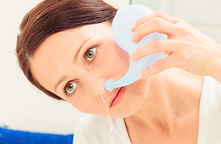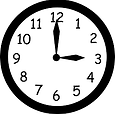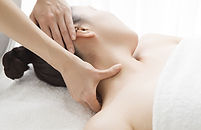SEASONAL ALLERGIES & SINUSITIS

Seasonal allergies are conditions that induce sneezing, runny or stuffy nose, and itchy eyes. It is sometimes referred to as “hay fever.” Majority of seasonal allergies are caused by pollen from trees or grass, and mold spores. People normally breathe in these chemicals without any complications but when a person with seasonal allergy inhale such, the immune system behaves as if it is toxic to the body. Seasonal allergies are chronic but with time, the symptoms might get better or worse. It also runs in some families.
SYMPTOMS
-
Stuffy nose, runny nose, or sneezing a lot
-
Waking up at night or trouble sleeping, which can lead to feeling tired during the day
-
Itchy or red eyes
-
Sore throat, or itching of the throat or ears
COMMON WAYS TO TREAT SEASONAL ALLERGIES
-
Steroid nose sprays – Steroid nose sprays are mostly prescribed by medical practitioners to individuals with seasonal allergies as it has been proven to work best for stuffy nose. They work best when used on a daily basis; however, it may take few days to fully perform its purpose. Steroid nose sprays work best when compared to other allergic medications for stuffy nose and post-nasal drip.
-
Antihistamines – Antihistamines are drugs that are used to stop symptoms of sneezing, runny nose and itching. Some of these drugs usually make people weak.
-
Decongestants – These are medications used for treating symptoms of stuffy, however, people with heart problems like high blood pressure are advised not to consume decongestants. Similarly, decongestant nose sprays should not be used for more than three days in a row as this might result in worse symptoms.
-
Allergy injections/shots - People with seasonal allergies opt to take an allergy shots. These shots are administered by an allergy specialist every week or month. It contains minute quantities of allergens like pollen. Many patients believe that this medication decreases their symptoms, but it may take months to get tangible result.
CHRONIC SINUSITIS
Sinusitis is a condition that causes a stuffy nose, ear pain, and nose drainage. When it occurs for a long-time usually 3 months, it is termed “chronic sinusitis.” Chronic sinusitis can also make you feel weak.
The sinuses are hollow areas in bones around the face. They are composed of a thin lining that produce mucus in small quantities. The lining swells and produces excess mucus when inflamed.
The most common form of sinusitis often occurs after a person catch cold. This is known as “acute sinusitis” and usually subsides after one to three weeks. Some individuals have irregular growths within their noses or sinuses called “polyps” which is responsible for bad sense of smell.

Triggers and Risk Factors:
These include
-
Environmental allergies
-
Food allergies and sensitivities - sample report shown here
-
Immune system disorders (hypogammaglobulinema)
-
Exposure to tobacco smoke and environmental pollutants
-
Bacterial and Viral infections

Symptoms of Chronic Sinusitis:
-
Decreased sense of smell
-
Nasal congestion
-
Facial pain, pressure, or “fullness”
-
Mucus discharge from the nose
-
Chronic cough
-
Halitosis (bad breath).
Treatment and Management of Chronic Sinusitis:
-
Daily nasal saline washing - A MUST DO !
One way to get rid of the symptoms of chronic sinusitis is by rinsing the nose with salt and water. This helps to clean the nose and remove any pollen found on the inside. There are several devices that can serve this purpose.

Traditional Pharmacologic Treatment:
-
Anti-histamine medications
These include over the counter meds such as allegra, claritin, zyrtec etc.
-
Anti-inflammatory nose sprays
Steroids are medications taken to relieve swelling and mucus and also polyps when present. These however, are different from steroids taken illegally by athletes. They can be used as sprays or drops applied in the nose.
-
Antibiotics
While chronic sinusitis is mostly caused by inflammation as opposed to infection, sinus infections might develop and worsen the symptoms. This makes the usage of antibiotics unavoidable. Antibiotics are used in treating sinus infections, which sometimes accompany chronic sinusitis.
-
Surgery
Surgeries are needed when people with chronic sinusitis have a blocked nasal passage. This surgery is used to eliminate polyps or mucus trapped in the nose. Surgery however, is a last resort when people with chronic sinusitis have been treated with medications without any relieve. In addition, at this point, testing must be done to rule out less commonly known causes of chronic sinusitis such as
chronic fungal infections, immunoglobulin deficiencies, and syndromes such as hyper IgE, specific antibody deficiencies and CVID.
Non-Pharmacologic Holistic Interventions:
-
A 5 Step Lifestyle Approach
Following 5 step approach when adopted for prolonged period of time can tremendously help alleviate symptoms of chronic sinusitis in 3-6 months. These lifestyle strategies should become a part of an overall healthy lifestyle and these habits should continue long term.
-
Intermittent fasting: When we eat, we accumulate toxins as a result of byproducts of digestion and metabolism. These toxins need to be rid of and this happens best when fasting because our bodies can do only one thing at a time effectively. Ingestion and detoxification cannot happen simultaneously. A daily 12-16 hours of fasting routine helps body get rid of toxins and mucus generated as a result.
-
Anti-inflammatory personalized diet: A healthy, non mucus producing, personalized, anti-inflammatory diet can be designed based upon food sensitivity tests. Identification of trigger foods (most commonly dairy and grains) and common sense approach to adopting anti-inflammatory diet can help alleviate symptoms.
-
Sun light exposure: Wear sun screen to block UV radiation but still allow vitamin D producing sunlight. A daily 15-30 minutes of sun bathing not only helps skin produce natural vitamin D but also improves circulation.
-
Outdoor walk/exercise: Outdoor walk and/or light exercise helps improve lung capacity and function of respiratory apparatus. This helps cilia or brush borders of nasal and lung passages to work properly. Remember to learn how to take deep breaths during exercise.



5. Improve lymphatic circulation: Improved lymph circulation helps remove mucus and reduce inflammation. This can be done by doing a combination of any of the following;
-
Raising head of bed and certain breathing techniques (such as those prescribed in Kriya yoga) can help improve localized lymphatic drainage in the sinus area.
-
Vigorous / high intensity interval training exercise helps improve lymphatic circulation overall.
-
Infra-red sauna on a 1-3 times a week basis can also improve lymphatic circulation.
-
Deep tissue massage on a weekly or bi-monthly basis can improve deep lymph flow.
-
Wet cloths (alternate warm and cold) done on a daily basis create warm-cold temperature gradient thereby increasing lymphatic flow.











